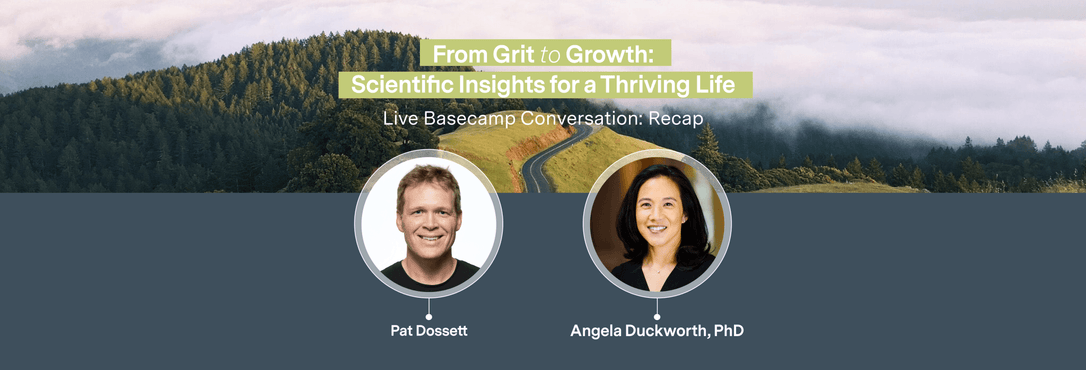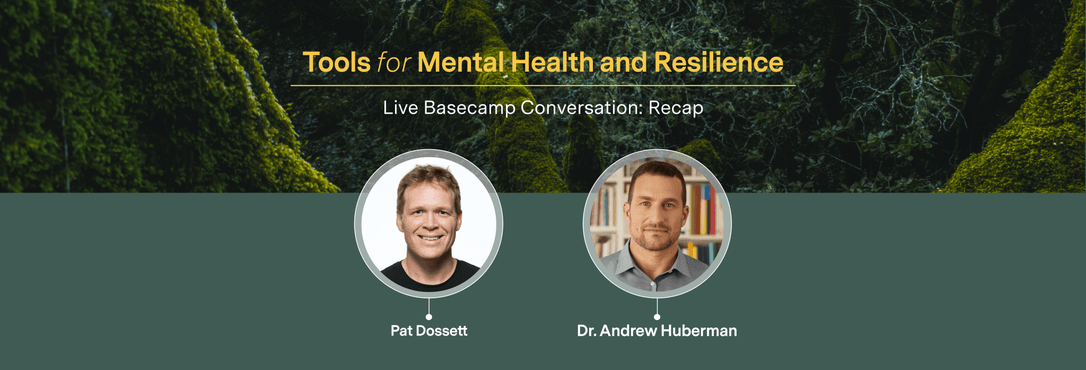The Power of Regret: How Looking Backwards Moves Us Forward
Madefor Co-Founder and former Navy SEAL, Pat Dossett, sat down with Daniel Pink, five-time New York Times best-selling author to discuss the research and findings behind his latest book, The Power of Regret. Daniel talked about regret, how there’s no such thing as an “I have no regrets” claim, the four most common buckets of regret, and how to use regret to transform your life.
Regret, Reflect, and Renovate
We all feel regret, it’s simply a part of the human condition. The emotion of regret is most often regarded as a bad thing and something we should avoid at all costs, but Daniel shines a light on it so we can find lessons from the past and transform them into opportunities for our future. How? By being courageous enough to confront your regrets and not run away from them.
We live in a society where none of us were taught how to deal with regret. Regret can be tricky, and spending a bunch of time wallowing in the past doesn’t do anything positive for your present and future. Instead, we need to reflect. Reflecting is looking backward, and when you look backward there are things in the past that we wish we didn’t do and there are things we wish we did do. There are decisions we made we don’t like. There are decisions we avoided that we wish we actually embraced.
Research done around regret had two major findings.
1. The first is simply that everybody has regrets. The people who say, “I have no regrets” are lying or they are part of a very small group of people, like 5-year-olds, people with degenerative brain diseases, and sociopaths. Regret requires cognitive trapeze work. It’s incredibly cognitively sophisticated to think about the past and then come back to the future.
2. The second finding from this research is that regret is one of the most common emotions that we have, and it’s arguably the most common negative emotion we have. Why is this thing that makes us feel bad so ubiquitous? The answer is pretty simple: it’s useful if we treat it right.
“We have to get past the notion we should never have regrets. We can enlist this emotion as a powerfully transformative force.”
~ Daniel Pink
The Undervalued Benefit of Regret
Regret gives us something important if we approach it in the right way: it clarifies what we value and instructs us on how to do better. Regret is conducive to helping us plan our future course by aligning our values with our actions.
In research done by Sonja Lyubomirsky, it was found that contemplating regret can improve your overall sense of well-being and satisfaction. When you write about positive experiences for 15 minutes a day for 3 consecutive days, it actually makes the experience less positive. Conversely, when you write about negative experiences for 15 minutes a day for 3 consecutive days, it actually makes the experience less negative. How is this possible?
Emotions are abstract. It is one of the reasons positive emotions feel so good. What makes negative emotions feel so bad is their amorphousness or nebulous nature. By converting them into language, you defang them and make them less menacing. You go from abstract to concrete, and that kicks off the sense-making process.
"Let's spend less time celebrating the destination and more time contemplating the journey."
~ Daniel Pink
The Four Categories of Regret
Daniel did two big research surveys about regret, one that was quantitative and one that was qualitative. His quantitative survey was The American Regret Survey. It is the largest public opinion survey about American attitudes about regret ever conducted. His qualitative survey is the World Regret Survey, a giant collection tool where he asked people all over the world: "Tell us about one of your regrets." They now have close to 20,000 regrets from people in 109 countries.The two surveys brought to light an array of insights, but the biggest one being that in all of the information received, four common themes of regret emerged. You can think of them in terms of an "If only…" statement.
The four categories of regret:
1. Boldness – "If only I'd taken the chance."
2. Foundational – "If only I'd done the work."
3. Moral – "If only I'd done the right thing."
4. Connection – "If only I'd reached out."
The boldness regret is one where we regret inaction more than action. It's a time when we had a decision between playing it safe and taking a chance, and we played it safe. Foundational regret is when we favor the present over the future and that's how we make our decisions. Part of those we have agency in and part of those we don't. Moral regrets stick with us the longest. It's heartening because what it suggests is most of us want to be good. On some level, we're wired to do the right thing. Finally, connection is the largest bucket of regret. Humans are social animals, and we need to feel a connection with other humans. Happiness is love, full stop.
"Love is connection. We need to expand our notion of love past romantic love. What people need is also the other kind of love you find with friendships, family, colleagues, etc."
~ Daniel Pink
Transform from Regret in 3 Simple Steps
To flourish from regret, you have to confront and process it. Regret makes us feel bad, but it helps us do better. Daniel laid out three simple steps to process regret and then move forward. It will help if you just focus on the four categories of regret. Choose a personal regret from one of the categories and then follow the 3-step process.
✨ Look Inward – Investigate yourself and your regret. Our internal dialogue can be cruel and vicious, and often we say things to ourselves we would never say to others. Practice self-compassion. Treat yourself and your regrets with kindness rather than contempt. Recognize that your missteps and mistakes are part of the human condition.
✨ Lean Outward – Disclosure is a form of unburdening, and it helps us convert our regret into concrete words and make sense of it. Put pen to paper if you’re still not ready to talk to another quite yet. If you’re feeling brave, connect with someone in your life to talk it out.
✨ Move Forward – Take a step back to extract a lesson from your regret. The techniques of self-distancing are very beneficial, empowering you to realign your values with your actions.
“Regret slows us down so we can see opportunities.”
~ Pat Dossett
Once you go through the process a few times, it becomes effortless. It also becomes a habit that allows you to take a negative emotion and transmute it into something positive. You can dive deeper into the subject in Daniel’s book, The Power of Regret.



